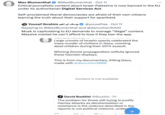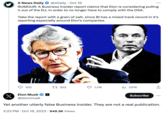Digital Services Act (EU Law)
Submission 9,198
This submission is currently being researched & evaluated!
You can help confirm this entry by contributing facts, media, and other evidence of notability and mutation.
About
Digital Services Act (EU Law) refers to a European Union regulation that went into effect in the EU in October 2023. The law requires companies to comply with rules regarding illegal content, transparent advertising, content moderation, and disinformation. The law holds companies like Google, Facebook, and Amazon legally accountable for the content posted to them.
Background
Ursula von der Leyen, President of the European Commission, has been a strong advocate for the Digital Services Act since 2019, introducing a proposal for the same during her 2019 bid for EU Commission presidency.[1] The Digital Services Act (DSA) builds on the non-binding Commission Recommendation (2018/314) concerning illegal content on platforms passed in March 2018 but also tackles issues like disinformation and data used for personalized advertising on very large online platforms. It aims to update and harmonize various EU countries' laws on illegal content, content moderation, disinformation, and transparency in advertising.[2]
Facebook Whistleblower Frances Haugen testified about the Facebook Files in the European Parliament in 2021, discussing Facebook's policies regarding prioritizing profits over harm reduction. The hearing influenced the creation of the DSA in how it strengthens rules on fighting disinformation and harmful content.[3] The Parliament also voted to add amendments to the DSA regarding tracking-free advertising and the use of minor's data for targeted ads. The Council of the European Union adopted its position on 25th November 2021, with Member States entrusting the European Commission with the enforcement of the new rules.[4]
Concerns about Russian disinformation during the 2022 Russian Invasion of Ukraine increased pressure on European policymakers to update regulations,[5] with the Parliament and policymakers voting the DSA law into effect on October 19th, 2023.
Euronews released a segment discussing the legislation on their YouTube[6] on January 21st, 2022 (seen below).
Developments
Under the new rules voted into law in October 2023, online platforms are required by EU law to implement ways to prevent or remove posts containing illegal goods, services, or content, as well as provide users with a viable avenue to report content.
The DSA also bans targeted advertising based on a person's sexual orientation, religion, ethnicity, or political beliefs, while severely restricting ads targeted towards children.
Moreover, the DSA requires platforms to be transparent on how their algorithms function, and how a website chooses to show certain content to a certain person or group or persons.
These rules apply to what is considered to be "very large online platforms," forcing them to allow users to opt out of profiling, hand over important data or researchers and authorities, and cooperate with crisis response systems as well as external and internal auditing.[7]
Platform Responses
On August 24th, 2023, Google announced that it would be making changes to its policy on ad transparency and researcher data in order to comply with the EU's DSA rule. The company announced that it would be "expanding" its Ad Transparency Center, a searchable repository that gives information about ads on Google, to comply with new EU regulations.[8]
Meta, Facebook and Instagram's parent company, released a report in June regarding its Ad Library and the inner mechanisms of its personalization algorithms. The company plans to soon start archiving and displaying all ads targeted towards EU users. Moreover, EU users will be able to view Reels, Story, and Search content chronologically on both Facebook and Instagram.[9]
TikTok plans to make its personalization algorithm optional for EU users, showing people videos from "both the places where they live and around the world." TikTok will also stop showing personalized ads to EU users 13-17. [10] Snapchat also announced similar updates allowing users to opt out of personalized ads.
Criticism
Various Tech companies pushed back on the new regulations proposed by the EU, with some companies being accused of lobbying in order to undermine some policy propositions, especially in relation to targeted advertising. Companies like Google, Meta, Amazon, and Microsoft began intensely lobbying Members of the European Parliament in late 2020, holding well over 50 meetings each.[11]
In November 2020, Google CEO Sundar Pichai issued a personal apology to French EU bureaucrat Thierry Breton after a document regarding Google's plan to undermine EU rules leaked to the public. Pichai claimed no knowledge of the document, assuring Breton that it was not representative of Google.[12]
The new regulation also received pushback from conservative media outlets and self-professed freedom of speech advocates.[13][14]
Elon Musk has been highly critical of the DSA, with media reports alleging that he has considered blocking X (formerly Twitter) in the EU to avoid complying with the new regulation. Musk[15] came forward to dismiss such allegations as false on October 19th, 2023 (seen below, left). On October 11th, X[16] user @MaxBlumenthal accused the EU of censoring pro-Palestinian content on X, gathering 3,000 likes in a week (seen below, right).


Search Interest
Unavailable.
External References
[1] European Parliament – My Agenda For Europe
[2] Euractiv – Digital Agenda Autumn Winter Policy Briefing
[3] Tech Crunch – Facebook Whistleblower
[4] European Council – What Is Illegal Offline Should Be Illegal Online
[5] Washington Post – Europeans Slap New Regulations On Big Tech
[7] The Verge – EU Digital Services Act Explained
[8] Google – Complying With The Digital Services Act
[9] The Verge – EU Digital Services Act Explained
[10] TikTok Newsroom – Fulfilling Commitments DSA Update
[11] Corporate Europe – how Corporate Lobbying Undermined EUs Push
[12] Financial Times – Google Sundar Pichai Theirry Breton
[13] Reason – EU Digital Services Act Threats American Free Speech
[14] Spiked-Online – The EU Wants To Crush Internet Freedom
[16] X – MaxBlumenthal
Recent Videos
There are no videos currently available.
Recent Images 2 total
Share Pin
Recent Images 2 total
Recent Videos 0 total
There are no recent videos.



Top Comments
Evilthing
Oct 25, 2023 at 07:38PM EDT
Mothman
Oct 26, 2023 at 01:38AM EDT